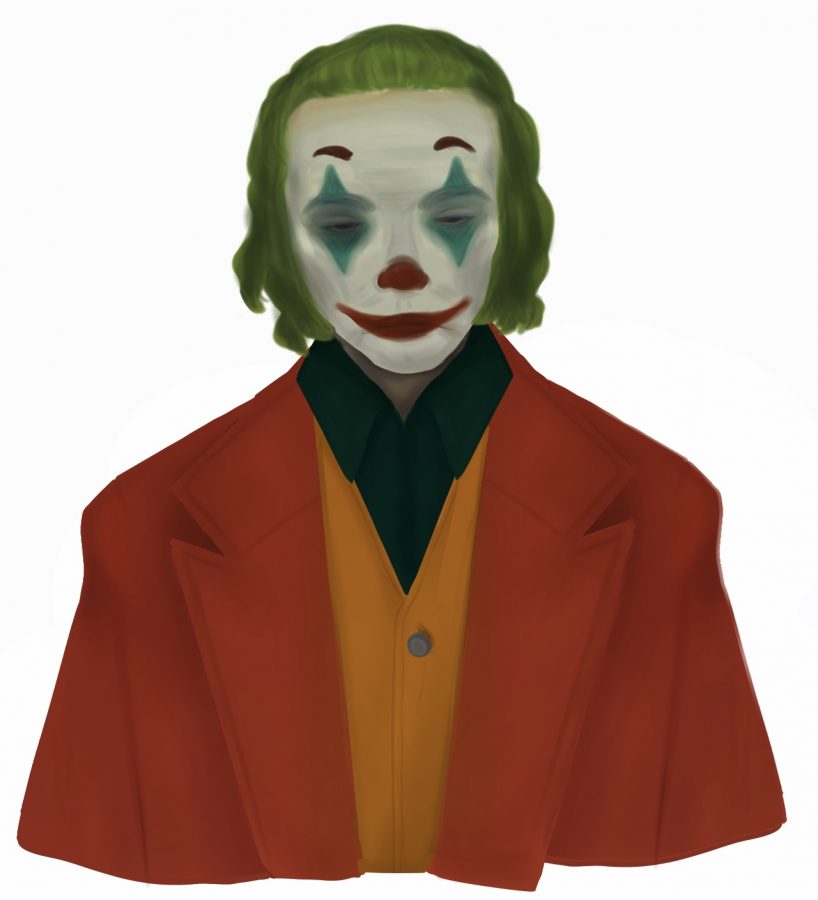“Joker” will leave you feeling empty
November 13, 2019
Todd Phillips’ origin story of the most infamous villain in comic book history this year, “Joker,” has faced by far the most controversy of any other film this year. It follows Arthur Fleck’s (Joaquin Phoenix) descent into madness, pushing him to become Batman’s arch-nemesis, the Joker. Since its announcement and subsequent premier, “Joker” has been a point of contention online, with many worrying that the film would glorify mental health and violence, and perhaps draw dangerous attention to the “incel” community. “Incel” stands for “involuntary celibate,” and represents an online subculture of misogyny, racism, and encouragement of violence. Due to the publicity of “Joker” and media coverage on potential threats, the U.S. military issued a warning about violence at screenings of the film.
The truth is, “Joker” doesn’t say enough—to movie-goers or incels—to deserve the debate. Phillips would love to have the audience believe the film is taking a stance on a myriad of issues, including mental health, class division, and the importance of kindness; however, none of these issues are handled with care or attention to detail, but rather with layers of hypocrisy and self-indulgence.
For example, Gotham—the fictional city in which “Joker” is set—citizens living in poverty form an uprising against the rich (an interesting recurring theme in recent blockbusters, considering Hollywood is the rich) with the Joker accidentally becoming the face. This works as a trivial plot device rather than saying anything about America’s economy. The film almost gets away with a message that if everyone was a little bit kinder, the world would be a better place, yet the message is undercut when it features a heartless and humorless gag using a dwarf actor. If it were really spreading a message of humility, it wouldn’t poke fun at a group of people consistently mocked for such a recycled, unfunny joke.
“Joker” wears its influences on its sleeve, borrowing heavily from Martin Scorsese’s “Taxi Driver” and “The King of Comedy,” as well as Christopher Nolan’s “Batman” trilogy, specifically “The Dark Knight.” Nonetheless, while Scorsese and Nolan create true character explorations with self-awareness and nuance, Phillips’ goal is shock value, a goal he reaches but keeps the audience bobbing at the surface with no intention to dive deeper.
The story is weak, meandering uncomfortably until its third act. Right off the bat, its protagonist is so blatantly creepy and disturbed that any attempt to make viewers empathize with him falls flat. The film’s two female characters, Arthur’s mother (Frances Conroy) and the neighbor whom he falls for (Zazie Beetz) are solely there to make Arthur angrier and seem more pathetic despite ample screen time for some real character development. Often, it’s hard to take “Joker” as seriously as it takes itself, making the audience feel like another one of Arthur’s bullies.
Despite its critical flaws, “Joker” has its merits. As usual, Joaquin Phoenix is spectacular. His high-pitched laughter will ring in your head for days, and the image of his protruding ribs and crooked back will be ingrained into your brain. It isn’t his best performance (“The Master”) or even his best “Taxi Driver” inspired performance (“You Were Never Really Here”), but as Phoenix twitches and giggles his way to becoming totally unhinged, it becomes evident that maybe there is something really, really wrong with the guy. He turns lines of dialogue that seem silly on paper into terrifying threats that hang in the air. His smooth movements sell a number of dancing scenes that by any other actor would feel awkward and unnecessary, but Phoenix makes instantly iconic. His insanity combined with Icelandic composer Hildur Guðnadóttir’s eerie and cello heavy score adds tension and elegance to a film that otherwise is devoid of any subtlety and class.
In short, “Joker” is not the game-changing character study it wants you to think it is. There are plenty of films that dove into mental health first, deeper, and better. Phoenix’s performance alone is sure to continue the “Joker” conversation until awards season, but Phillips’ contrived effort leaves the audience wanting more, and not in a good way.




